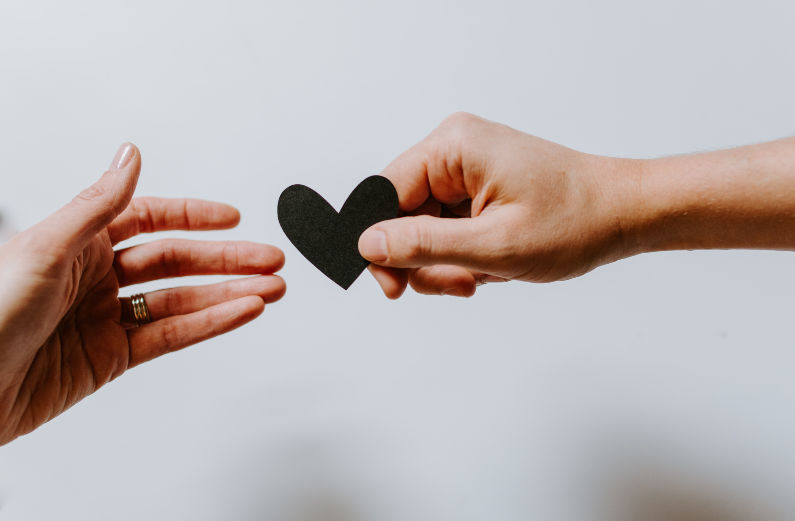A friend shared a link with me the other day that I have been pondering. The link was to an article by Life Changing Services entitled, “I Give Not Because I Have Not, But if I Had, I Would Give,” taken from Mosiah 4:24. As a group leader for spouses of those with pornography and sex addiction, I am always looking for additional resources to assist in the recovery of broken hearts. While this link led me to the specific focus on how married couples might regain a happy and healthy marriage, I have thought how it actually applies to many relationships that have been damaged intentionally or unintentionally. There are many things I don’t understand, but this form of journal keeping has been incredible. I encourage you to read the full context of this information!
I was particularly impressed with this analogy:
“Assuming both the husband and the wife are still invested in “winning the prize” — which in our context is the miracle of the marriage being healed or raised from the dead into a happy and healthy marriage — it is vital [that] both the husband and wife are diligent but wise when it comes to giving to the relationship. Each, as part of their daily personal connection time with God, must do an assessment on their “resources.”
Think of yourself as the steward over the supplies in your personal wagon. In your personal connection time with God, do a careful assessment of what you have to offer in the different areas of intimacy. Take an inventory of how much verbal intimacy resources you have. Then look at [these elements:] cognitive (plans for the future you are ready to share), emotional (things from the past you have feelings about), psychological (exchanges of ideas and feelings toward solving a problem), spiritual (sharing inspiration together) and physical (any level of touch and bodily connection).” [This excerpt includes edits made for clarification.]
I would like to expand on this concept of realizing that “I give not because I have not, but if I had I would give.” I believe it aptly applies to any human interaction, whether it be family, friends, or acquaintences.
In my interaction with students/clients, etc., as they are unhappy about a relationship, I invite them to consider what they would do if they needed to buy new tires for their car. Would they go to a grocery store to find them? And, upon seeing that the store doesn’t have any tires on the shelves, would you run screaming up and down the aisles, pulling things off the shelves and have a temper tantrum because they don’t have tires? Or would you consider going to a tire store?
How many times in relationships do we “need” or “want” someone to give us something they simply don’t have?
 Case in point: I am a communicator and I enjoy having deep conversations about emotional healing and relationships. My husband is a master storyteller, but when it comes to the type of communication that rings my bell, his eyes glaze over. By the same token, when he talks about his work (he is a master craftsman who works with steel and measurements that are right down to within a 64th of an inch in accuracy), my eyes glaze over.
Case in point: I am a communicator and I enjoy having deep conversations about emotional healing and relationships. My husband is a master storyteller, but when it comes to the type of communication that rings my bell, his eyes glaze over. By the same token, when he talks about his work (he is a master craftsman who works with steel and measurements that are right down to within a 64th of an inch in accuracy), my eyes glaze over.
Whenever he gets me a birthday, anniversary, or Valentine’s Day card, the sentiments bring tears to my eyes. When he finds the right card, he knows it. He knows what will speak to my heart, but he simply doesn’t have those words in his own “internal resources.” If he had them, he would give them to me, but they simply aren’t there.
Sometimes you just have to “shop in the store” that stocks the resources you need. It is wishful thinking that one person can possibly supply all the needs of another person. That’s why it is so important to identify what your needs are and understand which needs are met and which are not — and then to understand whether it is reasonable to expect the other person to stock those resources in their store.
The article goes on to say:
“If I understand you correctly, I hear that you are asking me to provide you with (fill in the blank). I care about you, so it is important to me that you have (fill in the blank). Unfortunately, after careful assessment with God, I am sad to tell you that I am not able to provide you with (fill in the blank) at this time. I am relieved that we both have access to God and His Son and His Atonement at this time so that your needs will not go unattended to. I do not know how God will take care of you. I am so grateful that [H]e will. I am so grateful that the scriptures tell us “Come unto me” and “I am the well of living life” and “do not rely upon the arm of flesh.” This brings me the comfort of knowing you need not go without even though I cannot currently provide what would take care of you.”
Observe and take note that this paragraph could really come across as bitter or sarcastic. Before you say or write something like this to your spouse, be sure to practice it until you can do so with full sincerity.”
What a huge blessing — that we know our Heavenly Father can and will provide us with our most basic needs. That is another dimension of how the Atonement heals and edifies.
How sad is it when someone says or thinks, “I’m not going to give of my resources because they brought this upon themselves.” Allowing my judgment of another person to give me “permission” to withhold my substance from them is a precarious stance. What about when I’m the one that brings condemnation upon myself? I don’t know about you, but when I review my own list of behaviors leading me to repentance, I don’t want justice — I want mercy.
Being in a mortal condition, each of us has limitations to the level of physical, mental, emotional, and spiritual resources available to us. There will be many times we will fall short of someone else’s needs — as well as our own.
Another important quote from the article:
“[I]t never occurred to me that my mental investment, my emotional investment, my creative problem solving skills, my compassion and empathy, my ability to get revelation, my skills with fine-tuned discernment and refined communication, etc., are all on the list of “substance” as described in this verse. I must always remember that in the same way water and vegetables come from God for a hard-working farmer, my gifts and talents come from God as well, notwithstanding how hard I work.”

To read more of Sonja’s articles, click here.
Being a lifelong learner is one of my most precious gifts. I cherish seeking for further light and knowledge. To paraphrase Life Changing Services’ article, I pray that none of us will intentionally withhold our resources from anyone on this planet in order to “teach them a lesson.” Those with abundant resources have a responsibility to make those resources available when they can be received and valued. Assuming we can do this to “teach a lesson” to someone who is in need of that resource is a form of pride. When you have been blessed with resources of compassion and long-suffering, I beg of you, please do not withhold resources you have been blessed with from anyone in order to “teach them a lesson.” You do not want to experience the same outcome in the final judgment of God.
I am so grateful to be learning more about the healing and enabling power of the Atonement in life’s day by day. Not only does it compensate for our mistakes and failures, it also heals us from the mistakes and failures of others. Most importantly, it heals those that we may have harmed intentionally and unknowingly. In so many ways, I echo these words: “I give not because I have not . . . if I had, I would give.”
About Sonja Hopkins
Sonja lives with her husband, Dale, on Anderson Island, Washington. She and her husband are Church Service Missionaries serving in the Addiction Recovery Program, focusing on pornography and sex addiction. She is also a certified life coach and teaches "Life Skills for Emotional Self-Mastery" in her stake twice a month. She does not teach you only to process something traumatic done to you in the past; rather, she helps you learn to feel it, heal it, and LET GO of whatever you still do to yourself and to others in order to cope with what was done to you in the past.
Twitter •







Lots of good things to think about here! Thanks, Sonja